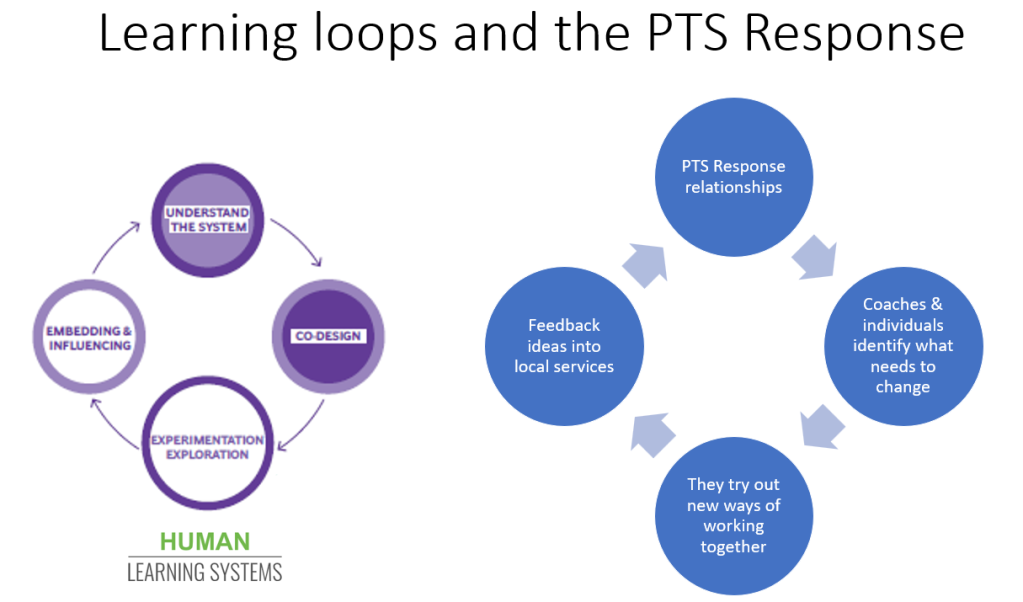Learning to live with uncertainty
A key principle behind Mayday Trust’s PTS Response (a person-led and strengths-based coaching alternative to traditional support work) is that the work between individuals is a learning process. It’s a learning process for the worker and the person they work with: the PTS Response is a ‘relationship-first’ approach, based on the idea that for any intervention to have a positive impact, it must first establish a positive, trusting and more equal relationship between the person seeking and the person offering help. That relationship enables the coach to learn what matters to the individual, what motivates and demotivates them, what they need assistance with, and where they want to build their skills, confidence, and what they might want to challenge and change in the often sub-par (and sometimes downright oppressive) systems they are living within.
That learning then feeds into the development of the approach and of us as an organisation, as we look for themes and patterns, and try to coproduce a constantly-evolving response to the people we walk alongside. We draw on the Human Learning Systems idea of Learning Loops, which posits that learning (rather than the often illusory achievement of outcomes) is the key indicator of organisational effectiveness, and that organisations should aim to learn, innovate and change above all else.
This approach feels right. It builds coproduction into every level of the organisation. While we do lots to measure impact and outcomes, our primary purpose in doing that is what Gateshead council’s Changing Futures team describes as using evidence for learning, not control. In place of traditional control (tightly defined roles, tasks and targets) we aim to recruit people who can take on and be accountable for autonomous roles, and who can contribute to us learning what works, innovating and improving. 
The learning approach is exciting and creative. It offers everyone in an organisation the opportunity to contribute to change and innovate. But it is also inherently uncertain, because nothing is ever set in stone. This can create anxiety and even a sense of chaos: there are times when we all hope to find certainty, or the right answer. That can be exacerbated by the uncertain nature of the external world, the ongoing sense of crisis in wider public services, and the familiar voluntary sector uncertainties of short-term funding. So how do we manage that uncertainty? That’s another question to which the answer(s) are emerging and will change, but here are three things we are learning can contribute to a sense of stability and security in an organisation dedicated to constant development and change:
- Strong shared values. Our values do not – and should not – change as often as our practice. They evolve as, for instance, more diverse representation in the team brings new perspectives and a deeper understanding of issues around oppression and racism. But a fit with our values is the test we most often apply when we debate trying out something new.
- Values-based behaviours. Organisational values on their own can be broad and hard to use in practice. Who doesn’t claim to have integrity, or other commonly expressed values? And how easy is it to suggest that a colleague lacks integrity without conflict? It is the behaviours that we commit to that are more useful in reflecting on our practice and giving useable feedback. In our Strengths-based Area paper with SCIE And Think Local Act Personal, we suggest behaviours as the key way of seeing whether an area is changing its practice and culture in reality.
- A coproduced strategy. Having a clear, shared sense of where we are and where we are going is reassuring. We have been wrestling with how to produce a three year strategy in which we can all see our work and our contribution, without drowning in detail. We have also been sharing as clear as possible a picture of where we are, including the realities of funding and funding challenges. That in itself can be anxiety-provoking in most charities, but less so than surprises: we can’t share accountability and genuinely influence organisational direction and practice unless we share similar levels of information about the pressures, as well as the opportunities, which face us all.
I’d be interested in hearing from other organisations about the journey to becoming a learning organisation.
This blog was written by Alex Fox, CEO of Mayday Trust. To read more of Alex’s thoughts visit: https://alexfoxblog.wordpress.com/

